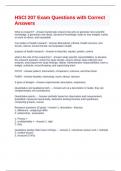HSCI 207 Exam Questions with Correct
Answers
What is research? - Answer-Systematic enquiry that aims to generate new scientific
knowledge. It generates new ideas, advances knowledge, leads to new insights, builds
on work of others, and repeatable
Four pillars of health research - Answer-Biomedical, Clinical, Health services, and
Social, cultural, environmental, and population health
purpose of health research - Answer-to describe, explain, predict, control
what is the role of the researcher? - Answer-study specific responsibilities, to develop
the research question, select the study design, ensure ethical, data collection and
analysis, and prepare the study findings, repeat. Administrative responsibilities, have a
budget, schedule, record-keeping, and supervising team
PICOT - Answer-patient, intervention, comparison, outcome, and time-frame
FINER - Answer-feasible, interesting, novel, ethical, relevant
3 types of designs - Answer-experimental, descriptive, exploratory
Quantitative and qualitative both... - Answer-aim at a description of reality, they are
complementary not contradictory
Quantitative points... - Answer-methods based on observation and measurement,
quantified, measured numerically, deductive (testing theories and hypotheses,
comparing groups), causal.
Research questions (3 types) - Answer-1. descriptive - features
2. difference - subgroups differ
3. relationship - association
1. Privacy =
2. confidentiality = - Answer-1. right
2. duty
Qualitative studies often have 3 things... - Answer-1. coherence (active verb + method)
2. content (issue)
3. structure (5 W's)
, Quantitative strengths and weaknesses - Answer-- Strengths: objective, generalizable,
measurement & explanation, describe health problems, sample, or population
experience
- Weaknesses: does not address lived experiences, cannot account for complexity and
contradiction, rigidly bound by categorization
Qualitative points... - Answer-methods are subjective and used to understand how and
what people interpret social phenomenas as, and emphasize meanings, context,
experiences, viewpoints, descriptive narratives, through interviews, focus groups,
observations, case studies. Uses a inductive approach (gather data and develop
theories from it)
Qualitative strengths and weaknesses - Answer-- Strengths: address complex issues,
holistic understanding, deep meaning and discovery, individual experience, high validity
Weaknesses: subjective, replication is rare, results not generalizable, convenience
samples may be bias
Mixed methods approach? - Answer-- Collecting and analyzing BOTH forms of data in a
single study
- Recognizes the strengths in both quantitative and qualitative methods
- Doesn't have to be "either or"
What is ethics? - Answer-- Study of mortality and application of ethical reasoning
- Right or wrong in any given situation through principles and practices
what is clinical ethics? - Answer-ethical conduct and decision making in relation to the
delivery of health care
What is research ethics? - Answer-ethical conduct and decision making in undertakings
intended to extend knowledge through a disciplined inquiry and/or systematic
investigation
Why do we have research ethics? - Answer-world war II, tuskegee, milgram, watch
queen, and stanford prison experiment
Who approves research in Canada? - Answer-tri-council policy statement 2018
(TCPS2)
What are the principles of ethical conduct in research? - Answer-scientific merit, respect
for persons, beneficence/concern for welfare, and justice
Codification of principles - Answer-nuremburg code, UN declaration of human rights,
declaration of helsinki, and belmont report




